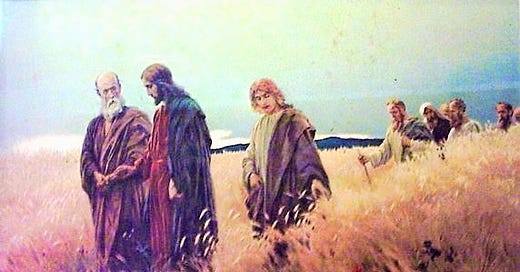Given how contentious politics is among Christians, I was eager to read David Lloyd Dusenbury's new book I Judge No One: A Political Life of Jesus.
When I say politics is contentious, I mostly mean how faith has become, for many Christians, reduced to politics. Among progressives, faith is equated with social justice activism. Among conservatives, faith is equated with Christian nationalism and nostalgia for a lost Christendom. Both groups increasingly define their faith as the winning of elections. So when you read the subtitle of Dusenbury's book -- "A Political Life of Jesus" -- you might expect it to go in one of those two directions. But the reason I was interested in reading the book is because it doesn't. In these polarized times, I Judge No One comes as a surprise.
In surveying the history of how Jesus' kingdom proclamation has been received by philosophers, Dusenbury sets out two main camps. On the one hand were thinkers who took Jesus' Kingdom of Heaven to be "a cipher of the theocratic political order [Jesus] hoped to impose on the 'land of Israel'. The logic of coercion belongs to Jesus' kingdom of heaven, and vice versa. What Jesus brought was... a 'political faith'." Today, the political visions of both progressive and conservative Christians assume this view. Christianity is inherently a "political faith," demanding that Christians establish a political order which, by definition, will involve the use of coercive power to make that order a reality.
The alternative view of Jesus, which Dusenbury describes using the work of Immanuel Kant, is that Jesus doesn't seek to establish a political order but instead preaches "a kingdom of of virtue." Dusenbury goes on to describe Kant's view of this:
Kant writes that Jesus 'brought about' through his life and death 'an incalculably great moral good in the world, through a revolution in the human race'. At the heart of that revolution is the idea of what Kant calls 'a kingdom of virtue'. And what is a kingdom of virtue? It is one which has 'freedom from coercion in its very concept'. It is a 'kingdom' which must be freely chosen.
Dusenbury's book defends, through a close reading of the gospels, this second view, that Jesus preached a kingdom of virtue that was rooted in freedom rather than the use of coercive power to achieve political goals. As Dusenbury sets out his thesis statements for the book's argument:
...I will try to show
(i) that the modern theory of a political Christ is utterly incongruent with the dramatic structure of our earliest texts on the life of Jesus; and
(ii) that something like Kant's theory of an ethical Jesus, whatever its limitations, is far more philosophically interesting.
Dusenbury ends his first chapter by quoting Nietzsche, who described Jesus as a "strange figure." Politically speaking, Jesus was a very strange figure. No one in the gospels could figure out the nature of Jesus's political project. Politically speaking, what was Jesus up to? Think about Pilate's puzzlement. What did Jesus want? Pilate couldn't figure it out.
The Romans, the Zealots, the Jewish political leaders, Jesus confused them all. I'd suggest that Jesus continues to confuse us. Neither progressives or the conservative Christians quite understand the political strangeness of Jesus. And Dusenbury's book is helpful in showing us why.




Politically, this seems exactly correct. Any type of coercive power is right out. That’s why Jesus and politics not only do not mix but cannot mix because, as I’ve commented before, politics is coercive power at its core.
Now, of course, God is all-powerful, but through history, especially after Constantine, the Church has misunderstood the nature of God’s power, which is love, not coercion.
However, I would not characterize Christian faith primarily as "a kingdom of virtue” but rather a “kingdom of transformation”. It has never been about ”doing” but rather about “being”.
I think that the author’s two choices may be too narrow. While I would want to avoid aligning the kingdom of God with social activism of with the left or right, thinking of it merely as values to attain leaves too much of the political element aside. We need to think of it in a Jewish context as well, tracing the understanding of kingdom through the Hebrew Bible, and then to Jesus Christ. If the Kingdom means anything we need to begin with the kingship, or Lordship of Jesus Christ. He obviously meant to inaugurate a new polis built on the basis of his person and teaching. Faith in the risen Christ means ultimate allegiance to him as Lord , and then living in communities that seek to live by the values of the Kingdom Christ inaugurated. I think that we should think in terms of kingdom communities, that love out those values. Most important, we cannot bring the kingdom to bear in this world, it only bear witness to it. The church community does not seek power, but to live by the values of the kingdom, and thus to be a light to the world, until Christ brings his kingdom to a renewed creation.